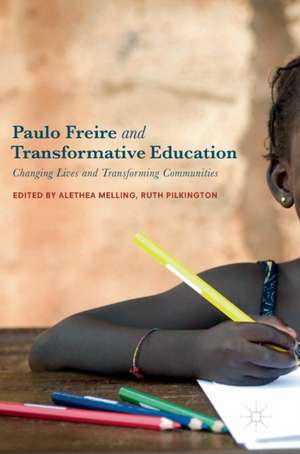Paulo Freire and Transformative Education: Changing Lives and Transforming Communities
Editat de Alethea Melling, Ruth Pilkingtonen Limba Engleză Hardback – 26 apr 2018
Preț: 730.16 lei
Preț vechi: 890.44 lei
-18% Nou
Puncte Express: 1095
Preț estimativ în valută:
139.74€ • 145.50$ • 118.09£
139.74€ • 145.50$ • 118.09£
Carte tipărită la comandă
Livrare economică 11-25 martie
Preluare comenzi: 021 569.72.76
Specificații
ISBN-13: 9781137542496
ISBN-10: 1137542497
Pagini: 240
Ilustrații: XXXIII, 272 p. 3 illus.
Dimensiuni: 148 x 210 x 24 mm
Greutate: 0.52 kg
Ediția:1st ed. 2018
Editura: Palgrave Macmillan UK
Colecția Palgrave Macmillan
Locul publicării:London, United Kingdom
ISBN-10: 1137542497
Pagini: 240
Ilustrații: XXXIII, 272 p. 3 illus.
Dimensiuni: 148 x 210 x 24 mm
Greutate: 0.52 kg
Ediția:1st ed. 2018
Editura: Palgrave Macmillan UK
Colecția Palgrave Macmillan
Locul publicării:London, United Kingdom
Cuprins
Chapter 1. Introduction; Alethea Melling.- SECTION I. Freire on the International Stage.- Chapter 2. The Relevance of Freire for the Post-2015 Debate on Development and Education and the Role of Popular Education; Tim Ireland.- Chapter 3. Paulo Freire and the Politics of Disposability: Create Critical Dissent Dialogue; Margaret Ledwith.- Chapter 4. Pedagogic challenges to the hegemony of neo-liberal business and management teaching; Tony Bennett.- Chapter 5. Researching to transgress and transform; Deanne Bell.- Chapter 6. Conceptual Landscapes of Global Environmental Consensization; Mahmood Chandia and Bob Walley.- Chapter 7. What should the public role of universities in an unequal society be?; Fernando Lanns Fernandes.- SECTION II. Transforming Communities.- Chapter 8. From Brazil with love: Youth Participation in Scotland: Key Features and Influences; Louise Sheridan.- Chapter 9. The Benefits of Giving: A Study of Learning in the Fourth Age; Trish Hafford Letchfield and Peter Lavender.- Chapter 10. Children and Young People in Dialogue with Researchers to Create Connections in the Community and the Classroom; Candice Satchwell and Cath Larkins.- Chapter 11. Bridging social work Professional Education and Community Work through co-learning and participation in Parenting Programmes; Trish Hafford Letchfield and Bernadette Thomas.- Chapter 12. Consensization and transformation in the workplace: a new form of workplace democracy in the mental health services; Mick McKeown, Fiona Jones and Helen Spandler.- SECTION III. Pedagogies.- Chapter 13. Introduction to Section on Freirean Pedagogy and Educators; Ruth Pilkington.- Chapter 14. The 'pedagogies of partnership': from Blair to Freire?; John Peters.- Chapter 15. A pilot evaluation of a community-based service learning pedagogy within an undergraduate Psychology degree; C Lambert, M Diviney, D Cowman, M Ivers and M Fitzpatrick.- Chapter 16. Freirean Approach within a Peer Led programme; Yasmeen Ali.- Chapter 17. The 'Magic' of Mentoring; Ridwanah Gurjee.- Chapter 18. Moving beyond 'impact': thinking critically about the role of higher education institutions in social transformation; Victoria Jupp Kina, Jean McEwan-Short.- Chapter 19. Teacher Education for Maladjustment: Teaching teachers to gallop and canter through the corridors; Deborah Bentley.- Chapter 20. Nurturing Musical Creativity - A Freirean Approach; Aleksander Szram.- Section IV. Conclusions; Alethea Melling
Notă biografică
Alethea Melling is the Director of the Centre for Volunteering and Community Leadership at the University of Central Lancashire, UK, and Visiting Professor at the University of Gujurat, Pakistan. Working internationally as well as locally, she focuses on the development of emancipatory community pedagogy.
Ruth Pilkington is visiting Professor to the Centre for HE Research and Practice, University of Ulster, UK, and a Professorial Fellow at Liverpool Hope University, UK. Her approach to teaching and learning focuses on a dialogic approach using processes of deliberative reflection and the concept of critical professionalism.
Caracteristici
Unifies global and local themes inspired by the work of Paulo Freire Emphasises the responsibility to intervene in reality as educators Includes a Foreword by Nita Freire
